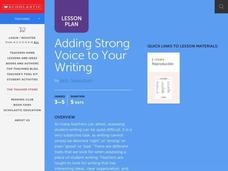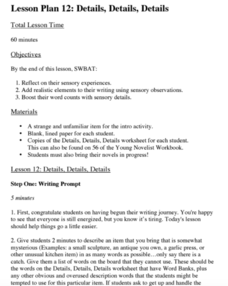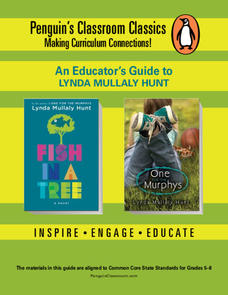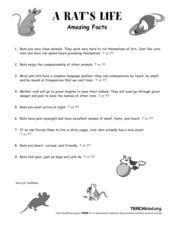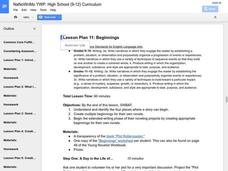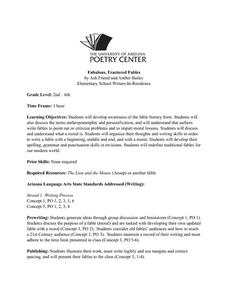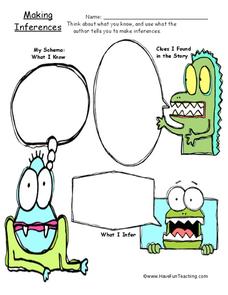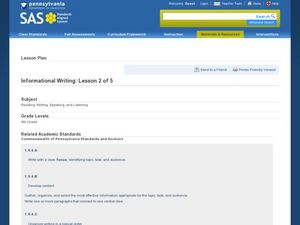Curated OER
Adding Strong Voice to Your Writing
Identify examples of strong voice in popular picture books. Young authors add voice to their writing and revise their own writing. In addition, they share their writing with their peers.
Curated OER
Details, Details, Details
Writing can become one-dimensional if authors don't involve all their senses. First, scholars observe a strange object which, ideally, they can touch and even smell. Without using certain words (you can create a list or have the class...
Curated OER
Teaching Writing: Is There a Right Way?
Delve into CCSS by implementing a writer's workshop model complete with mini-lessons, shared writing experiences, and author celebrations.
Penguin Books
An Educator's Guide to the Works of Lynda Mullaly Hunt
Middle school years can be tough. An educator's guide for the works of Lynda Mullaly Hunt introduces readers to two texts that discuss the struggles pre-teens face during middle school. Chapter-by-chapter questions and activities for two...
Curated OER
A Rat's Life
Here is a two-page worksheet on rats and mice. Learners answer nine true/false questions about rats and mice, then compose answers to seven short-answer questions about these two rodents. Finally, they must compose a fictional story...
Curated OER
Lesson Plan 11: Beginnings
Every good novel needs a solid beginning! Setting the stage can have your budding authors stumped, so use this lesson to get them thinking. After examining the plot rollercoaster image (included) they consider the four places their story...
Curated OER
Creating Supporting Characters
Supporting characters need detail and characteristics just like a main character. Keep your budding authors entrenched in detail as they write their novels. This lesson focuses on developing supporting characters using personal...
Curated OER
Turn the Ordinary into Something Extraordinary!
Summer writing ideas that encourage young authors to find their own writing prompts.
Curated OER
Lesson Plan 18: Art Project! Design Your Own Book Cover
Finished your novel? What’s next? Designing the book cover, of course. But how to begin? After examining the covers of published books and noting the common elements of these jackets, young novelists design a front and back cover for...
Curated OER
Write Right!
After watching part of a Club Write Kids video and discussing the editing process, each group of learners writes a letter to a favorite author. They ask for a copy of a page of manuscript that has gone through the editing process. Prior...
Curated OER
Narrative Writing vs. Explanatory Writing
The class discusses the different purposes an author has for writing. The focus of the discussion is on writing to tell a true story and writing to give information about a specific topic. There are writing purpose sorting cards embedded...
Curated OER
Analyzing Two or More Nonfiction Texts
How does recognizing the author's purpose help you draw conclusions about a topic? Using two articles (both are attached), learners brainstorm why each author wrote each article. Are their purposes similar or different? Learners use a...
Syracuse City School District
Literary Elements
Address the literary elements in a piece of writing using these materials. The packet includes plenty of resources, and focuses mainly on theme, character, and point of view, with some materials for setting, symbolism, and author's...
Curated OER
Fabulous, Fractured Fables
Elementary schoolers develop an awareness of the literary form known as the fable. They explore how authors write fables to pass along moral lessons. After reading and discussing many famous fables embedded in the plan, learners attempt...
Teacherfiles
Character Grid
Characters are built with more than just what the author directly says about a character (ex: she is smart). Help your pupils focus on several elements of characterization with a graphic organizer that has space for two characters....
Curated OER
Study Guide for Missing May
Use this comprehensive packet to accompany a study of Missing May by Cynthia Rylant. Starting out with a brief author biography and background information about the novel, this guide includes materials to use throughout the entire novel....
Have Fun Teaching
Making Inferences (1)
Provide readers with an opportunity to practice drawing inferences by giving them this activity. Kids identify the text and author, record a sentence they believe infers rather than directly says, and then write the deeper meaning the...
Have Fun Teaching
Making Inferences (21)
Monstrous! But do not be afraid! These weird-looking creatures won't scare readers away from making inferences about what authors are trying to show, rather than tell their readers. Instead the toothy, bug-eyed aliens model the process...
Curated OER
Dominant Impression
Students explore author's purpose, are introduced to dominant impression, make a list of descriptive words or phrases and write from personal experience.
Curated OER
Author's Purpose
In this worksheet on determining the purpose of writing, students read 3 short paragraphs and choose whether they were written to persuade, inform or entertain.
EngageNY
Inferring About Characters Based on How They Respond to Challenges (Chapter 4: "Los Higos/Figs")
How do you know what a character's personality is like if an author doesn't tell you? With a focus on character development in Esperanza Rising, pupils complete a jigsaw activity to analyze the actions of Mama, Abuelita, and Miguel. Once...
Curated OER
Fairy Tale Book Report Form
Motivate you class with this resource. Learners read a fairy tale and then fill out this book report. They identify the name of the fairy tale, the author, the illustrator, and the setting on each of the blank lines. Then, they fill in a...
Pennsylvania Department of Education
Informational Writing: Lesson 2 of 5
Introduce expository writing to your elementary learners. Young authors write a three-paragraph informational paper using the steps of the writing process. They follow guided lessons to experience each of five steps. Included are tons of...
Read Works
Signal Words in Expository Text
Signal words are one way that authors make the relationships between their ideas clear. Allow your learners the chance to investigate cause and effect in texts by identifying signal words. They locate and analyze cause-and-effect...
Other popular searches
- Authors Purpose
- Author's Purpose
- Author Study
- Authors Point of View
- Authors Purpose Powerpoint
- Authors Purpose Mini Lesson
- Author Research
- Authors Purpose Passage
- Georgia Authors
- Authors Study
- Teaching Author's Purpose
- Student Authors


